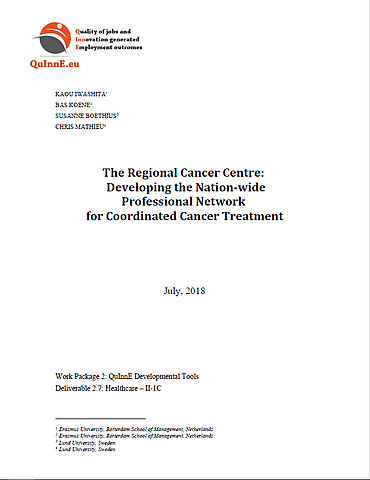Citation Note
Based on field research; 7 pages.
Follow the 'handle' link to access the Case Study on RePub.
For EUR staff members: the Teaching Note is available on request, you can contact us at rsm.nl/cdc/contact/
For external users: follow the link to purchase the Case Study and the Teaching Note.
Abstract
The case highlights the bi-directional causal relationship between job quality and innovations in the hospital sector. It focuses on The Regional Cancer Care (RCC) South, a unit that developed and coordinated the cancer care at hospitals in the Southern Healthcare Region in Sweden. This unit aimed to foster the exchange of knowledge and expertise of the cancer care professionals on a national level. Simultaneously, it played a role in disseminating the innovations across the regional hospitals. RCC itself was a result of nation-wide organizational and processual innovation. The establishment of RCC entailed the change in work allocation of some employees at the hospitals. They were assigned to work half of the time at RCC and other time at their hospitals. Such innovations in work process also enabled them to take part in the improvement of cancer diagnoses and treatment on a national level. Other workers at the clinics were also able to make an impact on the cancer care at a larger scale by passing on their ideas to their colleagues working at RCC. This case aims to prompt the students to examine the approach that RCC implemented to create a bridge between the regional hospitals, and to aggregate the expertise to improve the cancer care across the country by connecting regional centres, connecting regional centres and local hospitals, and academics and practitioners. It outlines how the organizational restructuring resulted in the improvement of job quality of the medical professionals. At the same time, the high job quality, enhanced with the multidisciplinary nature of the work, was an essential input for more innovative potentials to be realized. Furthermore, the case offers an insight into the challenges the RCC South faced when encouraging the doctors to implement the knowledge and initiatives developed at RCC into the work at their hospitals for which they had held discretion.
Objective
1. Analyze the challenges associated with the process of bridging the academic and healthcare industry. 2. Highlight and discuss the roles of skilled professionals in realizing organizational and processual innovations at a country-level. 3. Understand the bi-directional causal relationship between job quality and innovation where successful innovations enhance the meaningfulness of the work, and at the same time, the innovative work structure is a necessary condition for the innovation to be realized. 4. Understand the challenges with involving the independent skilled professionals into national-level innovation and knowledge development body.
